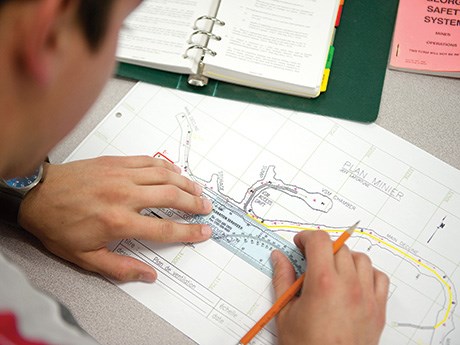College has graduated more than 240 students from the program since 1995
The primary language of communication in Ontario mines is English, but with close to a half million francophones in Ontario – most of them in the northern part of the province – and with Quebec right next door, a French-language mining program for mining technicians and technologists makes a lot of sense.
Collège Boréal, a French language community college in Sudbury, has offered its Civil and Mining Engineering
Technician and Technology programs since its founding in 1995.
“We have graduated more than 240 students and have alumni working right across Canada,” said program co-ordinator Jeff Lafortune, a 15-year veteran of the industry and a Boréal grad himself.
While the language of instruction is French, the college prepares students for the bilingual market. Graduates fully conversant in both French and English can find employment in Quebec and Ontario mines, as well as in sales and technical support roles with mining supply and service companies that serve both provinces.
“For example, when I was working for River Gold Mines (now Wesdome Gold Mines) north of Wawa, we had a contractor come in from Quebec and they needed a go-to guy to liaise between the two teams because there was a language barrier,” recalled Lafortune. “I was in the middle to make sure the job got done safely and efficiently.”
The Boréal program also offers students another unique advantage in that it prepares them for employment in both civil and mining engineering roles.
“If it’s not going well in mining, there’s the civil market to fall back on. If the civil market is slow, there’s mining they can rely on,” said Lafortune.
The technicians graduate after two years, while technologists are required to complete a third year that includes specialized courses and a seven-week co-op placement.
“The timing of the placements – from March break to the end of April – is ideal because it’s a good way for companies to mold students and get them ready for a summer or full-time job,” said Lafortune. “I’m proud to say that more than 70 per cent of our students have a job right after their placement.”
After seven years with River Gold, Lafortune returned to Sudbury for a job opening up the McCreedy West Mine for FNX, following which he worked for Inco and Vale for seven years.
“During my last years at Vale, I did some part-time teaching at Collège Boréal. It was a great opportunity to share my passion for mining with students because when I was on the job, we’d get co-op students who were at different levels.
Some were really good and others needed help. I found myself working really hard to help students who needed more help and I said, ‘You know, this teaching thing might be for me.’ When this opportunity came up at the college, I jumped on board and have been here for six years now.”
Knowing the mining industry as intimately as he does, Lafortune makes sure to prepare his students both academically and otherwise. For example, his classroom is equipped with a hybrid tag-in board with cubbyholes into which students are required to deposit their cellphones. Instead of catching up on social media during a break, students are encouraged to pick up a copy of Sudbury Mining Solutions Journal or CIM Magazine to “read up on what’s happening in the mining industry.”
Respectful behaviour and proper dress are stressed, as is the importance of networking.
“We’re lucky to have a number of organizations like the Canadian Institute of Mining and Metallurgy and Modern Mining and Technology Sudbury promoting the mining industry,” said Lafortune. “We encourage our students to go out and connect with people and sell themselves.
Every February, Boréal students participate in Mining Day along with students from Cambrian College and Laurentian University. Conceived in 2010, Mining Day brings together students, professors and representatives of the mining industry for open discussion and presentations.
“Students are encourage to ask questions like ‘How do I get my foot in the door?’ or ‘I’m a girl. Am I going to be accepted?’ Last year, we had 300 students and faculty in attendance,” said Lafortune.
Collège Boréal also offers a Prospecting and Exploration Technician program. Launched in 2015, just when the exploration industry went into a deep depression, the two-year program prepares students to identify minerals and anomalies, assist geologists at a base camp, take samples, log core, map and work with software.
Enrollment has been disappointing because of the downturn in exploration, but extensive consultation with the industry prior to the launch of the program indicated a need for it, and the college is optimistic that a turnaround is in the offing and that students will be attracted to opportunities for employment in the mineral exploration sector.



